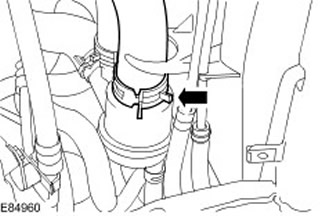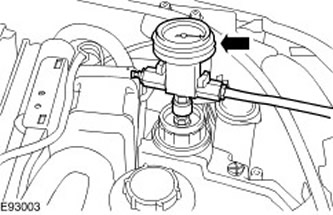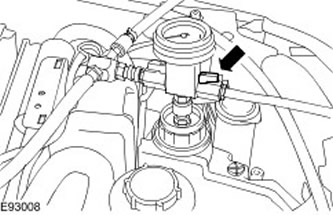CAUTION: To avoid scalding yourself from hot coolant or steam, take extra care when removing the coolant expansion tank seal when the cooling system is warm. Allow the engine to cool, then wrap a thick cloth around the expansion tank cap and slowly unscrew it until pressure build-up begins. Step back while depressurizing the cooling system. After making sure that the pressure is completely relieved, and without removing the cloth, turn and remove the sealed cap of the coolant expansion tank. Failure to follow these instructions may result in injury.
CAUTION: To prevent corrosion and engine damage from freezing coolant, fill the engine cooling system with the correct grade of antifreeze at the correct concentration. Failure to do so may result in engine damage.
CAUTION: Coolant can damage paintwork. If you spill coolant, remove it immediately and flush the area with water.
1. Set heater controls to maximum heat (NOT).
2.
WARNING: Do not remove the coolant expansion tank cap when the system is hot, as steam or coolant escaping from the cap could cause serious injury such as scalding.
Turn away a cover of a broad tank.
3.
WARNING: Do not work on or under a vehicle supported only by a jack. Always place secure supports under the vehicle.
Raise the car and place it on stands.
4. Remove the front left mudguard. Release 4 clips.

5. Remove the panel that blocks access to the radiator. Turn out 4 bolts.

6. Place a container to catch spilled liquid.
7. Disconnect the coolant hose from the thermostat.
- Release the clamp.
- Drain the coolant.

8. Disconnect the coolant hose from the thermostat.
- Release the clamp.
- Drain the coolant.

9. Remove the spare wheel with tire.
- Remove the toolbox.
- Get access to the winch.
11. Disconnect the rear heater coolant hoses.
- Release 2 clips
- Drain the coolant.

12. Connect hoses of a cooling liquid of a back heater. Fasten the clamps.
13. Install the spare wheel with tire. Put the tool kit in place.
14. Connect the cooling system hoses to the thermostat housing. Secure with a clip.
15. Prepare a sufficient amount of coolant of the required concentration.
16. Install the vacuum filling adapter of the cooling system on the expansion tank.

17. Install the vacuum filling gauge on the cooling system charging adapter.

18. Install the venturi assembly on the gauge of the vacuum filler.

19.
NOTE: Make sure both valves on the meter are in the closed position.
NOTE: The vacuum tool requires an air pressure of 6 to 8 bar to charge the coolant properly.
NOTE: Small diameter or long air lines may restrict airflow to vacuum coolant charging tool.
Connect the controlled hearth and compressed air line to the venturi assembly.

20.
NOTE: Make sure there is no air in the hose.
Place the coolant pickup tube in a container of old coolant.
21. Place an air evacuation hose into the container.
22. Open the air supply valve.

23. Open the coolant supply valve for 2 seconds to fill the coolant hose.

24. Apply air pressure gradually until the pointer on the gauge on the vacuum filler reaches the green segment.

25. Close supply and air valve.

26. Wait 1 minute to make sure the vacuum is maintained. Disconnect the compressed air supply line.

27.
NOTE: When the coolant reaches the upper mark (MAX) expansion tank or coolant stops flowing, close the coolant supply valve.
Open the supply and coolant valve to prime the system with coolant.

28. Remove the vacuum fill gauge and coolant charge adapter assembly.
29. Connect hoses for removal of the fulfilled gases to back exhaust pipes.
30. Check coolant level, top up if necessary.
31. Establish a cover of a broad tank of system of cooling.
32. Start the engine and let it run.
- Maintain the engine speed at 3000 rpm for one minute.
- Let the engine run at idle for 5 minutes.
- Maintain the engine speed at 3000 rpm for one minute.
- Let the engine run until the thermostat opens.
34. If the car gets coolant, wipe it off.
35. Install the radiator access panel. Tighten the 4 bolts to 10 Nm.

36. Install the front left mudguard. Install clamps.
37.
WARNING: Do not remove the coolant expansion tank cap when the system is hot, as steam or coolant escaping from the cap could cause serious injury such as scalding.
Check coolant level, top up if necessary.

Comments on this article